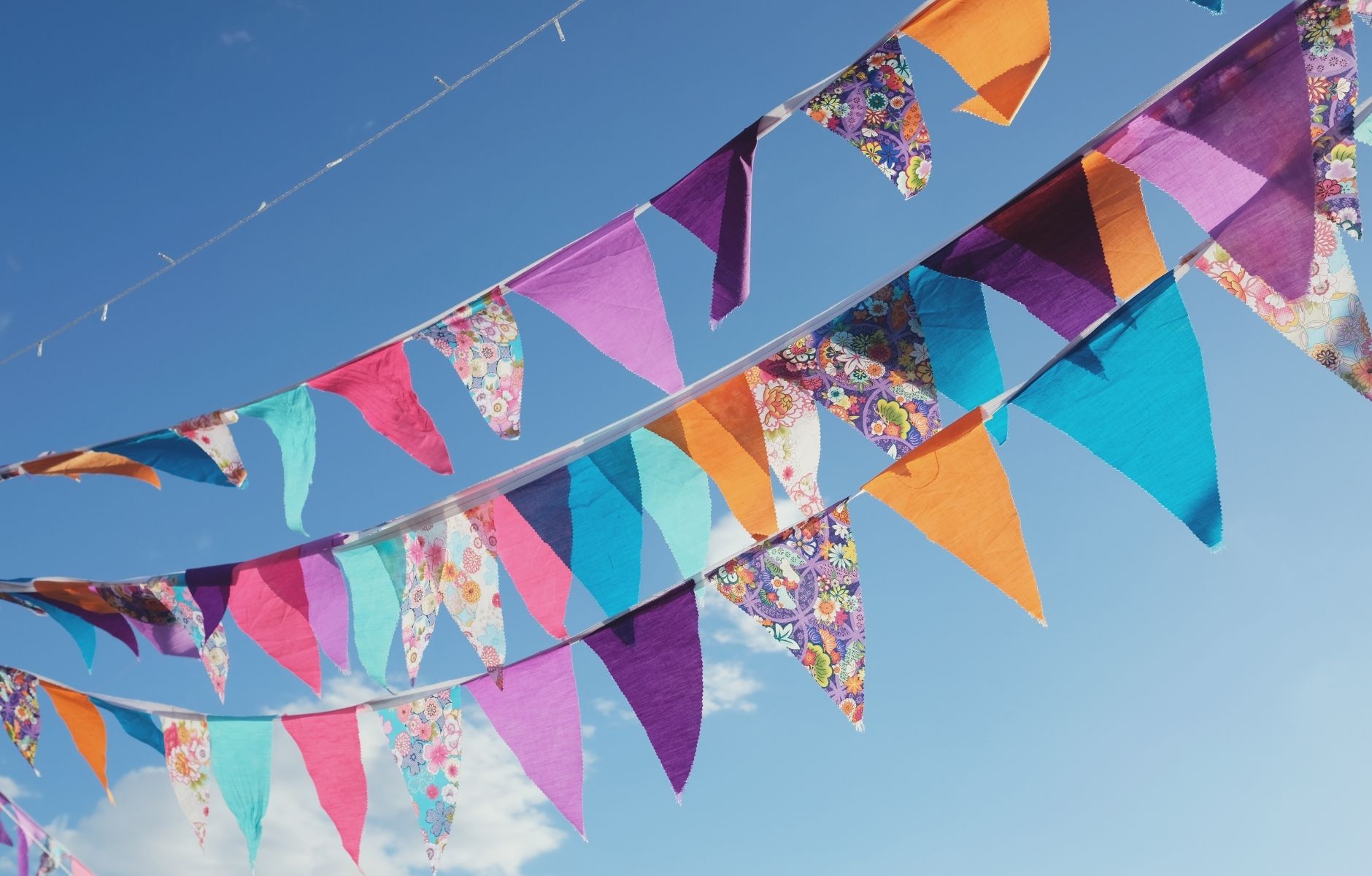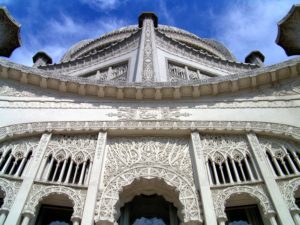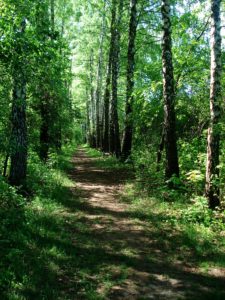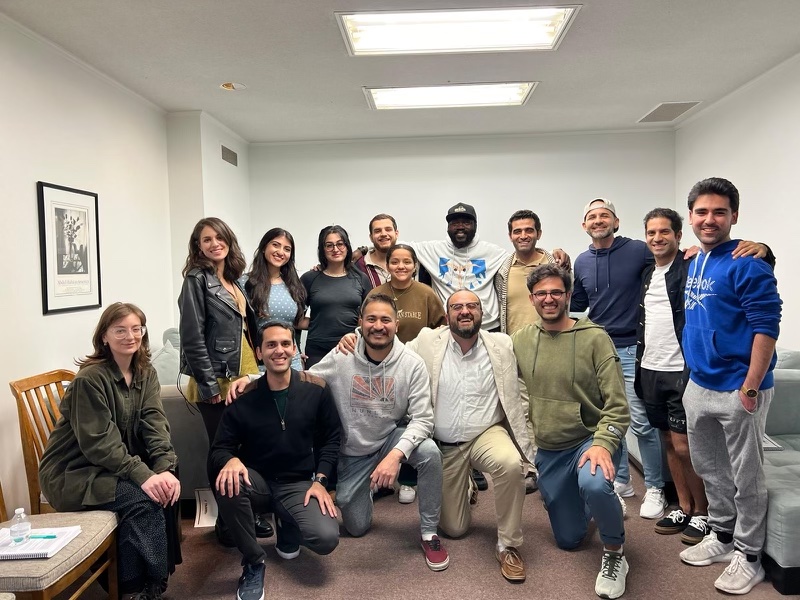
Profile: Summer fair gives Mennonite girl a glimpse of her future

By Michelle Goering

I first encountered the Baha’i Faith when I was 11, at the Kansas State Fair. For a farm kid from a Mennonite town of 500, the fair was full of opportunity. I could dodge through the crushes of people — more people than I’d see the rest of the year combined — eat new things, watch the rabbits, goggle at the life-sized cow made of butter, listen to a sheep complain as it was sheared or watch a chef stir-fry shrimp in the suspended mirrors.
My visit to the fair’s Baha’i booth was different. The air in this draped space was calm and energized. I saw pamphlets about unity, buttons that said “One Race, the Human Race,” and a poster with the names of Founders of the world’s religions — including Moses, Christ, Muhammad, Buddha, Krishna, and Baha’u’llah — all coming from the word “God” like rays of light from the sun. I was intrigued; these ideas were new for me as a Mennonite and Christian.
The Mennonites and Amish began as the same group: the Anabaptists of the Protestant reformation starting in the 1530s. They were pacifists who refused military service, taking the scripture of “turning the other cheek” quite literally, and they would not swear allegiance to any government; their allegiance was to Jesus Christ.
This stance was unpopular with governmental bodies, and meant martyrdom and persecution and moving from place to place in Germany, Switzerland, France, Poland, the Ukraine and Russia. They farmed wherever they went, kept to themselves, and preserved their language, culture and religious practices. Many came to the United States beginning as early as the mid-1600s.
My mother grew up Old Order Amish in Nappanee, Indiana. She had an 8th-grade education from a one-room schoolhouse, spoke Pennsylvania Dutch at home, had no electricity or car, wore only plain dresses and prayer caps over her long braided hair, and sat for church services on a backless bench for four hours on Sundays in a neighbor’s house or barn.
Mom left home to serve as a cook at a Mennonite mental health institution in Newton, Kansas, and soon after left the Amish church to join the more liberal Mennonites. There she met and married my father.
Dad was a Mennonite and native Kansan, a schoolteacher and farmer. Like Mom, he came from a large farming family, and also grew up speaking German, though he and Mom laughed at each other’s dialects. They bought a farm near a tiny, mostly-Mennonite town where Dad taught 6th grade.
I grew up there, a Mennonite among other Mennonites. My extended family, my farming neighbors, the kids and teachers at school, were all part of this same culture. All white, all ethnically related, many with the same handful of last names.
Our church was affiliated with the college that I would later attend, Bethel College in our hometown of Newton, Kansas. Bethel was home to social activists and conscientious objectors to war, as well as more conservative evangelicals. Perhaps 80% of the students had some Mennonite heritage in the 1980s when I attended.
Dad had studied at Bethel also. He believed that God loved everyone and felt that Christ could not be the only Way God had ever allowed for anyone to know Him. We pondered these questions together, though our family was committed wholeheartedly to our community. We all took care of each other, carried out service projects and contributed to the community’s financial needs. When everyone shares one religion, culture, and history, though there can be conflict, there can also be close cooperation and security.
I appreciated all this, yet my life lacked the richness a diversity of cultures and perspectives brings. And even as a teen, I saw that though the Mennonites cared about the world’s peace and its justice, everyone wasn’t going to become a Mennonite; this still-separate community was not going to be the way forward for humanity. “How are we all going to come together?” I wondered. Every problem humanity faced stemmed from our divisions.

I heard about the Baha’i Faith again when I spent a semester in Chicago at The Urban Life Center. This program brought students from rural liberal arts schools into the city’s South Side for a term, with Chicago as our classroom.
Each week we visited a different religious place or service. One weekend we went to the Baha’i Temple in suburban Wilmette, the northern end of the “L” line. Though we missed the visitor’s center entirely, having no guide with us, I was deeply moved by the scriptures carved into the dome of the sanctuary, from the Writings of Bahá’u’lláh: “Ye are the fruits of one tree, and the leaves of one branch,” and “All the Prophets of God proclaim the same faith.”
I remember thinking, “Why don’t I know anything about this world-embracing Faith? Why wasn’t it in my comparative religions class? Who are these Bahá’ís?” What beautiful ideas, what peace pervaded that space, how open and welcoming and transcendent it felt.
I returned to school in Kansas after that semester and often thought about my Baha’i Temple visit. I was a member of the Mennonite church, baptized at age 16, but I’d stopped attending. I felt stifled after my experience in Chicago. The church seemed caught in arguments over doctrine and rituals divorced from my desire for a uniting faith. I went for a time to a house church, then a Quaker meeting. I felt restless.
A couple of years later, when Tim, my then-boyfriend/now-husband of more than 30 years mentioned that his new jazz instructor at Wichita State and some members of his band were Baha’is, I wanted to meet them.
I was moved by the Owens family’s warm welcome. We began to spend evenings learning about the Baha’i Faith, studying from the Writings of Baha’u’llah with the family and their friends. My circle expanded as I got to know people from a wide variety of religions, races, ethnic backgrounds and life experiences.
Our ongoing conversation was sincere and centered on big questions: Who were we as members of the human family? What was our purpose here on earth? What spiritual qualities did we need to develop to build a peaceful and just world? I began to read more from the Baha’i Writings on my own, and started to understand myself and my role: “Noble have I created thee, yet thou hast abased thyself. Rise then unto that for which thou wast created.”
I also saw humanity’s progress would depend on our unity: “The well-being of mankind, its peace and security, are unattainable unless and until its unity is firmly established,” the Baha’i Writings state. I remember thinking, “Yes, here is how mankind will create lasting peace: through a new understanding of ourselves and of religion that removes otherness and unites us.”
Tim and I both became Baha’is a few months after beginning our study. Putting our lives on this path of spiritual growth and service cemented our bond.
We married five months later, and continue to strive to develop spiritual qualities and build unity in our family and community more than 30 years later.

Recently, on a visit to Kansas, I reflected as I walked the woods behind the college. I thought of all I had received from my Mennonite family—a love of God, a sense of belonging, a desire to serve—and all I embrace as a Baha’i.
I thought of how I grow spiritually as I study, pray, and apply the teachings of Baha’u’llah in my own life and relationships. I know myself as a member of the human family created by one God, Who has revealed His eternal religion successively to every people, never leaving His people without guidance.
I realized that I live in a unique moment, one my Mennonite and Amish ancestors prayed for and risked so much for: the time for building God’s Kingdom on earth, as it is in heaven. Baha’u’llah, this most recent Divine Messenger, has brought this part of God’s blueprint, and all of us are invited.




